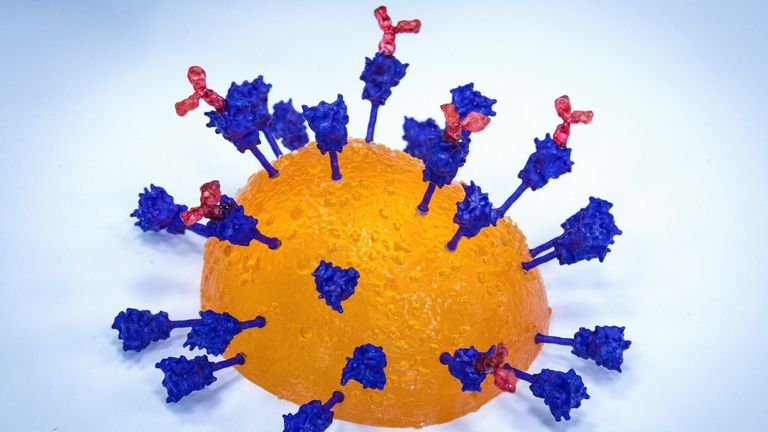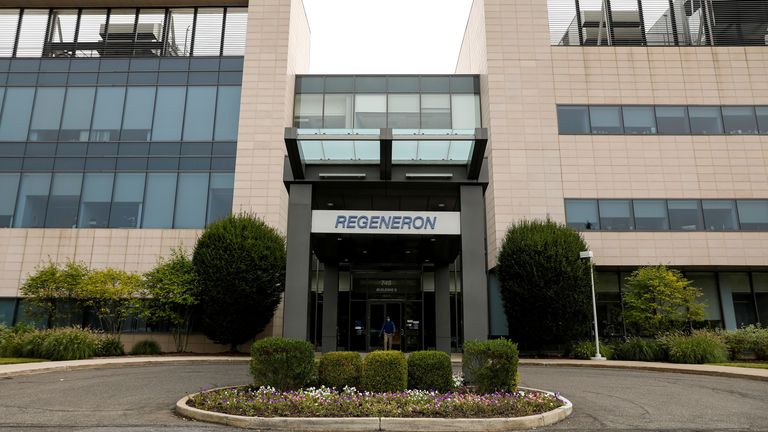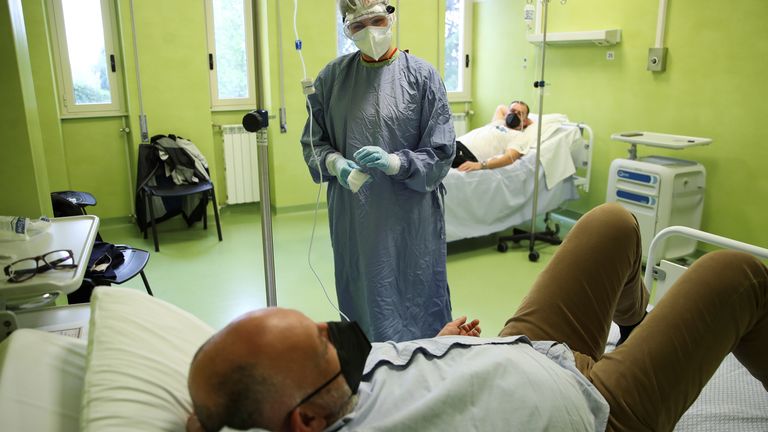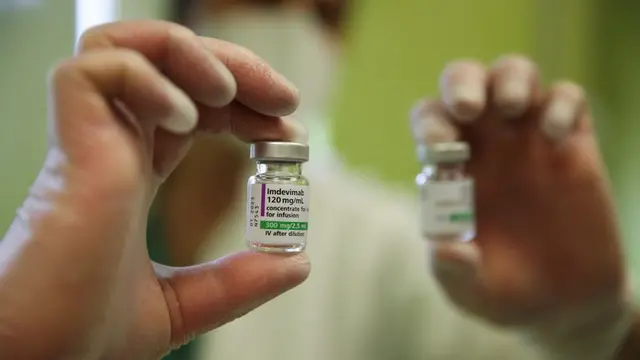A new drug to treat COVID has been described as "very exciting" in its ability to lessen the effects of the virus in seriously ill people.
It uses a therapy called
monoclonal antibodies
- artificially manufactured proteins that prevent the virus
attacking the body.
What are monoclonal antibodies?
Monoclonal antibodies have been around for a while, used to treat other diseases like cancer.
Once introduced to the body, they stick to antigens - proteins on the outside of a cell, bacteria or other molecular structure like a virus, capable of causing disease.
They have been effective against some types of cancer because they can help the body's defences identify and destroy cancer cells or slow the growth of such cells.
Why are they effective against COVID-19?
With
COVID
, the SARS-CoV-2 virus has proteins on its outside in the shape of spikes which enable it to attach itself to human cells and enter them, causing infection.

Image:The SARS-CoV-2 virus with antibodies locked on to its spike proteins
The two monoclonal antibodies in REGEN-COV - the name of the new treatment being hailed by scientists as "exciting" - bind specifically to two different sites on the
coronavirus
spike protein, neutralising the ability of the virus to infect cells.
The idea is to inject these artificial antibodies - casirivimab and imdevimab - so they bind to the virus in a bid to stop the infection in its tracks.
Does it work in everyone?
The treatment, made by Regeneron, is only thought to work in people who do not develop antibodies of their own, which most people do when infected by an antigen.
But some cancer patients, people with compromised immune systems and some others who fail to make an antibody response do not generate their own natural antibodies to
COVID
and are less able to fight off serious infection.
The Recovery trial - which tested the effectiveness of Regeneron's treatment - found a third of patients admitted to hospital with the disease who took part in its random study did not have natural antibodies. It was not known if a further sixth had their own antibody response to COVID.

Image:The new monoclonal antibody treatment, REGEN-COV, is made by Regeneron
How good is it at treating COVID?
Out of the 9,785 enrolled in the Recovery trial of REGEN-COV between 18 September 2020 and 22 May this year who produced no natural antibodies, researchers found the monoclonal antibodies reduced the chance of them dying within 28 days by a fifth, compared with those who had not taken the drug.
The finding could be important going forward because
COVID-19
vaccines are not 100% effective, especially against some variants
. Some people may have both doses and still get sick. Others are unable to have the vaccines for medical reasons.
Monoclonal antibodies could provide a treatment for people who have the vaccine but still get sick or don't have the vaccine and get sick as a result.
What do the study's authors say?
Sir Peter Horby, professor of emerging infectious diseases in the Nuffield Department of Medicine, University of Oxford, and joint chief investigator for the Recovery trial, said: "These results are very exciting.
"The hope was that by giving a combination of antibodies targeting the SARS-CoV-2 virus we would be able to reduce the worst manifestations of COVID-19.
"There was, however, great uncertainty about the value of antiviral therapies in late-stage COVID-19 disease.
"It is wonderful to learn that even in advanced COVID-19 disease, targeting the virus can reduce mortality in patients who have failed to mount an antibody response of their own."
Earlier studies also showed the treatment reduced viral load, shortened the time to resolution of symptoms, and significantly reduced the risk of being admitted to hospital or death.

Image:Patients, like this one in Italy, have the antibodies introduced into their bodies intravenously
When will it be available in the UK?
It is thought that, even if it is fast-tracked, it may be some time before the treatment is rolled out on the NHS.
It will need to go through regulatory approval from the Medicines and Healthcare products Regulatory Agency (MHRA) and it will take some forethought from the NHS as it will require patients to be tested to see if they have antibodies when they are admitted to hospital - which is not currently standard practice.
The study's authors say, going forward, with "intensive" manufacture, it could cost around £1,000 or £2,000 for the one-off therapy - per person, per treatment.
Professor Stephen Powis, national medical director for NHS England, said: "These encouraging results from this trial carried out in and by the NHS suggest a new treatment option to help save the lives of some patients hospitalised with COVID and are the latest example of research and innovation for patients, which the NHS has played a role in during the pandemic.
"Studies have also suggested the same treatments might help similar patients in the community avoid going to hospital in the first place, which is why yesterday the health service chief executive, Sir Simon Stevens, asked the NHS to rapidly establish a new monoclonal antibody service so we are ready to offer these drugs if backed by regulators."
What other new therapies are being used to treat COVID-19?
Dexamethasone
and **Tocilizumab
** have already been rolled out to treat the effects of the virus, but these are both therapies that tackle the body's response to having the virus - suppressing the immune system's inflammatory reaction to the virus, to stop it going into overdrive.
Researchers say the difference with REGEN-COV is that it offers a treatment that actually targets the virus itself.
The new therapy could be used in combination with other treatments.
The Recovery trial is also looking at several other potential treatments, including:
-
baricitinib (an immunomodulatory drug used in rheumatoid arthritis)
-
dimethyl fumarate (an immunomodulatory drug used in psoriasis and multiple sclerosis)
-
high-dose vs standard corticosteroids
In addition, there are thousands of clinical trials of COVID-19 therapies taking place across the world.
 简体中文
简体中文





